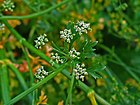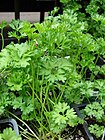Note: This is a project under development. The articles on this wiki are just being initiated and broadly incomplete. You can Help creating new pages.
Petroselinum crispum
Parsley or garden parsley (Petroselinum crispum) is a species of flowering plant in the family Apiaceae that is native to the central and eastern Mediterranean region (Lebanon, Israel, Cyprus, southern Italy, Greece, Portugal, Spain, Malta, Morocco, Algeria, and Tunisia), but has naturalized elsewhere in Europe, and is widely cultivated as an herb, and a vegetable.
Contents
- 1 Uses
- 2 Parts Used
- 3 Chemical Composition
- 4 Common names
- 5 Properties
- 6 Habit
- 7 Identification
- 8 List of Ayurvedic medicine in which the herb is used
- 9 Where to get the saplings
- 10 Mode of Propagation
- 11 How to plant/cultivate
- 12 Commonly seen growing in areas
- 13 Photo Gallery
- 14 References
- 15 External Links
Uses
Antimicrobial, Antiseptic, Antispasmodic, Gastrointestinal disorders, Inflammation, Halitosis.
Parts Used
Chemical Composition
Petroselinum crispum (Mill) flat leaves specimens were isolated and identified the flavonoids apigenin (1), apigenin-7-O-glucoside or cosmosiin (2), apigenin-7-O-apiosyl-(1 --> 2)-O-glucoside or apiin (3) and the coumarin 2",3"-dihydroxyfuranocoumarin or oxypeucedanin hydrate (4). [1]
Common names
| Language | Common name |
|---|---|
| Kannada | |
| Hindi | |
| Malayalam | |
| Tamil | |
| Telugu | |
| Marathi | NA |
| Gujarathi | NA |
| Punjabi | NA |
| Kashmiri | NA |
| Sanskrit | |
| English | Parsley |
Properties
Reference: Dravya - Substance, Rasa - Taste, Guna - Qualities, Veerya - Potency, Vipaka - Post-digesion effect, Karma - Pharmacological activity, Prabhava - Therepeutics.
Dravya
Rasa
Guna
Veerya
Vipaka
Karma
Prabhava
Habit
Identification
Leaf
| Kind | Shape | Feature |
|---|---|---|
| Simple | Leaves 10–25 cm long with numerous 1–3 cm leaflets |
Flower
| Type | Size | Color and composition | Stamen | More information |
|---|---|---|---|---|
| Bisexual | Yellow to yellowish-green | 2 mm diameter |
Fruit
| Type | Size | Mass | Appearance | Seeds | More information |
|---|---|---|---|---|---|
| Simple Fruit | ovoid | 2–3 mm long | {{{6}}} |
Other features
List of Ayurvedic medicine in which the herb is used
Where to get the saplings
Mode of Propagation
How to plant/cultivate
Parsley grows best in moist, well-drained soil, with full sun. It grows best between 22–30 °C (72–86 °F), and usually is grown from seed. Germination is slow, taking four to six weeks, and it often is difficult because of furanocoumarins in its seed coat. Typically, plants grown for the leaf crop are spaced 10 cm apart, while those grown as a root crop are spaced 20 cm apart to allow for the root development. [3]
Commonly seen growing in areas
Photo Gallery
References
External Links
- Ayurvedic Herbs known to be helpful to treat Antimicrobial
- Ayurvedic Herbs known to be helpful to treat Antiseptic
- Ayurvedic Herbs known to be helpful to treat Antispasmodic
- Ayurvedic Herbs known to be helpful to treat Gastrointestinal disorders
- Ayurvedic Herbs known to be helpful to treat Inflammation
- Ayurvedic Herbs known to be helpful to treat Halitosis
- Herbs with Seeds used in medicine
- Herbs with Leaves used in medicine
- Herbs with common name in English
- Habit - Herbs
- Index of Plants which can be propagated by Seeds
- Herbs that are commonly seen in the region of Lowland forest
- Herbs
- Apiaceae




